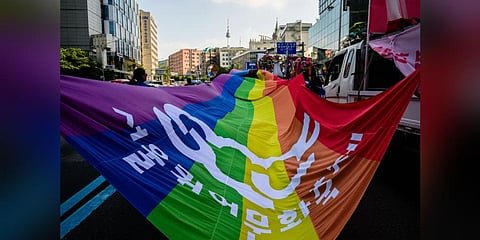

SEOUL: Tens of thousands of South Koreans brought rainbow pride to the streets of Seoul on Saturday for an annual celebration of LGBTQ rights, while demonstrators against them snagged a prime site marchers had used since 2015.
This year's Pride Parade, one of Asia's largest, was denied permission to congregate at the central plaza where the main festivities have traditionally taken place.
Instead, an increasingly vocal Christian-led opposition was granted the spot, highlighting the struggles South Korea's campaigners for LGBTQ rights face.
The heat, humidity and backlash still did not deter supporters from throning to Seoul's Queer Parade, which organisers estimated drew a crowd of around 50,000 people.
"There is no public forum to disclose one's true identity elsewhere except for the Pride Parade and that's why so many people are here today in solidarity," said chief organiser Yang Sun-woo.
Just a few hundred metres away, thousands of protesters denounced LGBTQ rights and opposed marriage equality, chanting "no same-sex marriage" and holding signs that read "Marriage is a union between a man and a woman".
Police provided security along the route, maintaining a cordon between the pride marchers and the mostly Christian demonstrators.
Last month, South Korean lawmakers introduced legislation that would recognise same-sex partnerships, without which advocates say LGBTQ couples face discrimination and are denied rights accessible to heterosexual couples, such as health insurance and taxation benefits.
The bill remains with a standing committee.
Attempts to pass laws banning discrimination on the basis of sexuality have languished for more than 15 years, with lawmakers coming under pressure from conservative and religious groups.
Nearly a quarter of South Korea's population is Christian and around 40 percent of its lawmakers are Protestant, church figures show.
Authorities in Seoul said the allotment of the central plaza this year was due to a scheduling conflict, but city officials have also recently voiced opposition to sexual minorities.
In June, the city's conservative mayor Oh Se-hoon said he "personally can't agree with homosexuality".
And in November, parliamentary Speaker Kim Jin-pyo suggested one way to raise the country's dismally low birth rate was to promote a "therapeutic campaign for homosexuality".
Last month, scuffles broke out in the southern city of Daegu after officials there attempted to block pride celebrations.